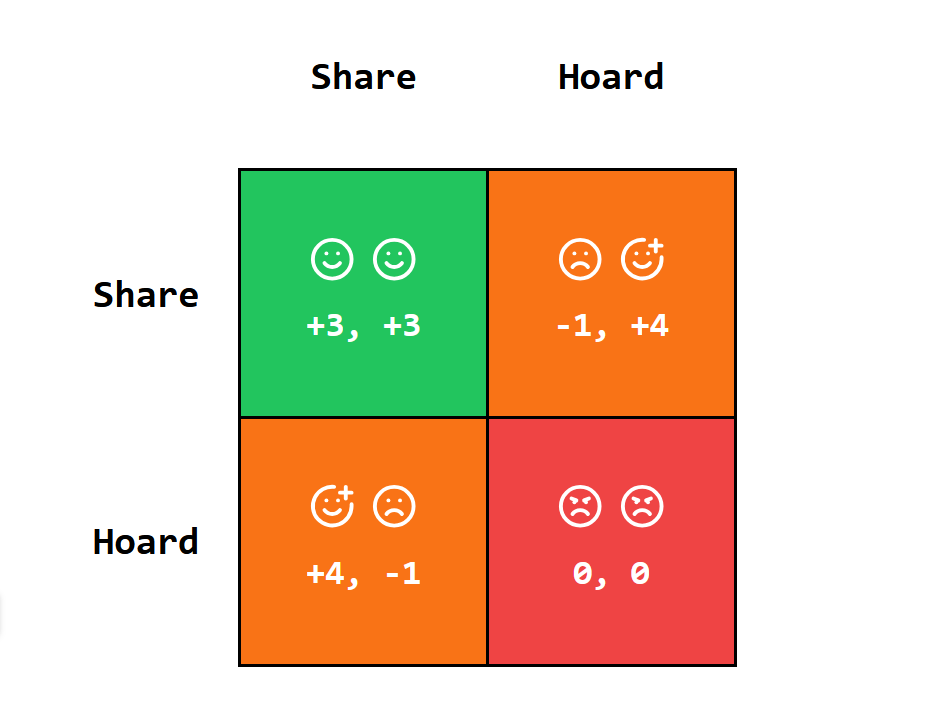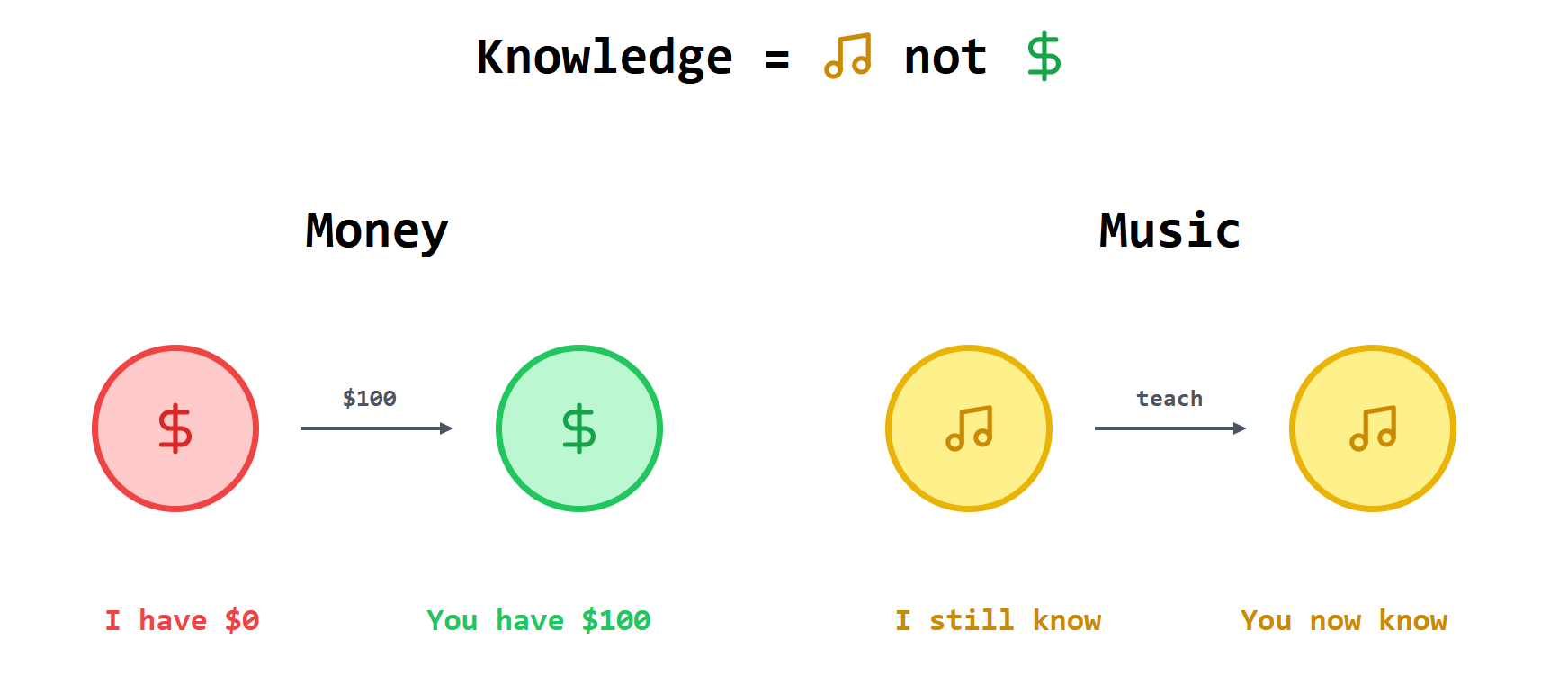I learnt the Infinite Sum Game on moving to SF from India & I can't stop playing
A mindset shift that changed the way I think about the world
In India, knowledge is currency. Three months ago, if another founder asked me about my marketing strategy, I’d give them some generic answer and change the subject. You don’t share knowledge until there’s something in it for you.
I recently moved to San Francisco. A CTO of a unicorn startup had read one of my blog articles and we started talking over DMs. When I got to SF, I asked him to meet, and he agreed.
We met in FiDi for a casual lunch. This guy runs the entire company, and he was treating me — a new founder — like an equal. He was openly sharing his experiences, his journey, and his insights. When we were leaving, he offered to help with connections, fundraising, whatever I need.
He gave me a full hour of his day, just to shoot the breeze like two developers do.
This was nothing like what I was used to. Back in India, a person with even a 100-person office would have an air of arrogance. They’d guard their knowledge and time, only sharing when there was a clear benefit to them.
It was that day that I understood the beautiful “infinite sum game” being played in SF.
India’s Zero-Sum Prison
In India, there’s a specific national exam that all of us strive to (talk to any one of your Indian friends and they’ll know exactly what I’m talking about.) We are sold a dream from childhood, if we get a good score in this exam, an entire life from career to friendships to marriage is a guranteed success. Because of our population, over a million young minds take the exam every year. But there’s only so many good colleges, and only the top ten thousand get in.
This perverts young minds. We’re taught to hide knowledge because everyone is competing against you. Your goal was always to be smarter, faster, better — with resources you don’t tell people about, tutors you don’t share, study schedules you keep to yourself.
Because there was scarcity, there was always competition.
SF’s Infinite Sum Game
In SF, things seem to be different. Anyone I talk to and ask for help, they’re happy to help. They take out valuable time from their day and help new founders who’re starting out. Since I was coming from a zero-sum mindset, for the first few weeks, I was confused. Why is everyone so generous?
I am reminded of the Prisoner’s Dilemma, one of my favorite game theory concepts. Put simply, if both players cooperate, they both get a good outcome. If one player defects, they get a good outcome, but the other player gets a bad outcome. If both players defect, they both get a bad outcome.

Startups (and life) are an infinite prisoner’s dilemma. If you expect the other player to hoard knowledge, your strategy is to hoard as well. Thus, if everyone operates in a scarcity mindset, they become defensive and always hoard.
In India, there are so many players working towards the same limited resources, it is natural to always hoard. But, that lack of cooperation means that the net reward doesn’t grow.
In SF, people have figured out the best way to play this infinite prisoner’s dilemma: always cooperate. This creates a positive sum game, and extended over time, it becomes the infinite sum game.
The Five Monkeys Experiment
There’s a famous (apocryphal) experiment about monkeys that explains how this mindset gets passed down. Researchers put five monkeys in a cage with a ladder and bananas at the top. Every time a monkey tries to climb, they spray all the monkeys with cold water. Soon, the monkeys attack anyone who tries to climb the ladder.
Then they stop the water but keep replacing monkeys one by one. New monkeys try to climb and get attacked by the others. Eventually, all the original monkeys are gone, but the group still attacks climbers — even though none of them have ever been sprayed.
This is exactly what happened in India. The scarcity was real during our parents’ generation. There genuinely weren’t enough good jobs, college seats, or opportunities. So zero-sum thinking was the best strategy. Unfortunately, that thinking got crystallized into culture and passed down to us, even though the game has changed.
The Economics of Knowledge Sharing
In India, we treat knowledge like money. If I give you $100, I have $100 less.
But sharing knowledge isn’t like giving money — it’s like teaching someone a song. When I teach you my favorite melody, you can play it whenever you want, but I can still play it too.
And now, maybe we can make music together.

I don’t think the CTO I met was calculating returns on his time. He was genuinely excited to help someone figure things out.
Understanding this intellectually is one thing. Rewiring years of conditioning is another. Even now, months later, I catch myself hesitating before sharing certain insights. The old reflexes die hard.
But something beautiful has started happening. Every time I help another founder — make an intro, share a strategy, offer advice — I’m not doing it with expectations. I genuinely want to see them succeed.
Why This Matters Beyond Startups
I used to think San Francisco’s dominance in tech was about venture capital, or having Stanford nearby, or some mystical “innovation culture.” But I think the real secret is simpler: people here genuinely want to see each other succeed.
When knowledge flows freely, everyone gets smarter faster. When successful people mentor newcomers, not for strategic reasons but because they remember being newcomers themselves, talent grows exponentially.
India has incredible talent, but we’re stuck in a mindset where helping others feels dangerous. It still optimizes for individual survival.
Thinking Bigger
Zero-sum thinking made sense when resources were genuinely scarce. But in a knowledge economy, the communities that share knowledge fastest will always outpace the ones that hoard it.
San Francisco figured this out first, which is why it’s still the center of innovation decades later. But it’s not magic. Any city, any country, any community can choose to play this game.
The question then becomes: will communities finally learn to cooperate, or will the best people leave first?
Increase engagement and retention
Our whitelabel AI vibe coding platform allows your users to customize and build exactly what they need, on top of your platform.
My customers say that this is the best way to increase engagement and retention in 2026.
Curious? Check out Giga Catalyst to learn moreOr, fill out this form and I'll personally reach out to show you how it works:
